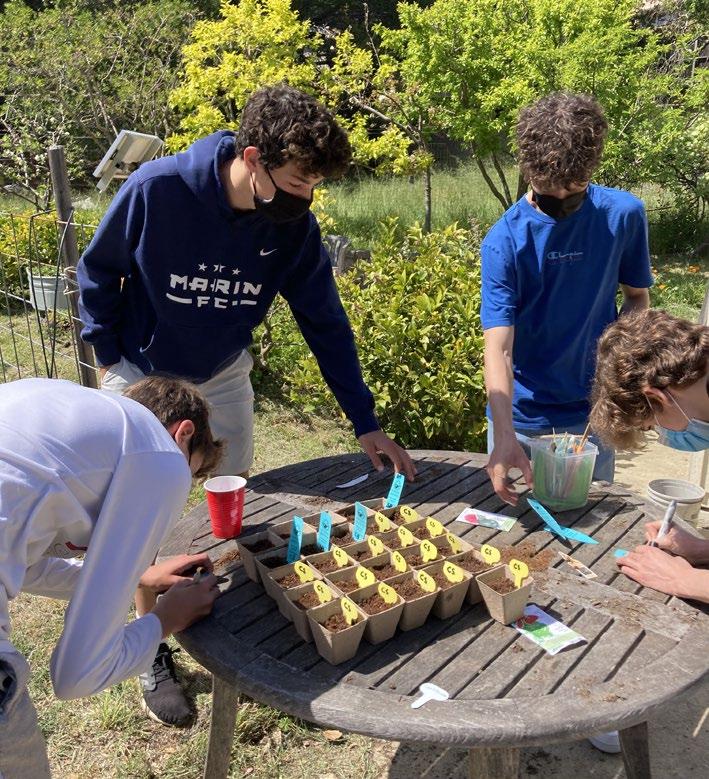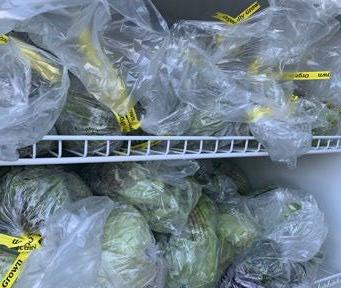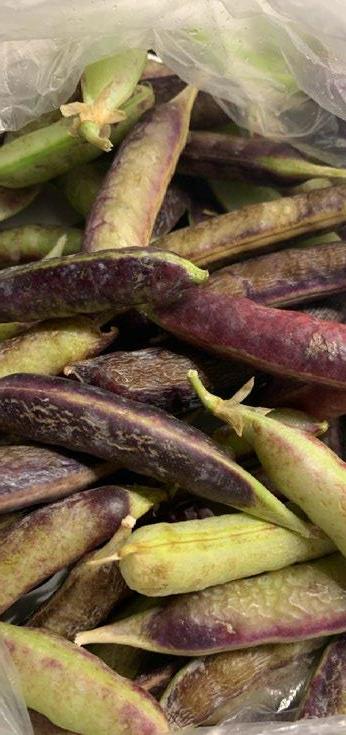
5 minute read
SEEDS OF CHANGE
from 2021 NEXUS Magazine
Cars lined The Circle, bringing an unusual amount of activity to campus on a Saturday morning last November. Masked Marin Academy families, faculty, and staff had arrived to collect packaged seeds, soil, and containers to grow fruits, vegetables, and herbs at their own homes. Organized by MA Gardening for Food Security, a collaboration of MA's Climate Action Council, Community Action, and Marin Academy Parents' Association, the event was the first of many at MA to address the overwhelming demand on food banks in Marin County. In March, the seedlings would be brought back to MA to be Community transplanted into the MA garden and eventually distributed to local families in need.

Led by students Ashley M. '22 and Negin G. '22, with support from MA gardener Gina Neri and MA teachers James Hughes, Liz Gottleib, and Mark Stefanski, MA Gardening for Food Security was created in response to increasing food insecurity in Marin County. Defined as a "limited or uncertain availability of nutritionally adequate foods or uncertain ability to acquire these foods in socially acceptable ways" by Healthy Marin, food insecurity is exacerbated by poverty and unemployment and is associated with chronic health problems in adults and children.
The pandemic has further intensified food insecurity in Marin and across the country. Today it is estimated that 12.2% of Marin County suffers from food insecurity. "In the garden, I learned how much work goes into getting produce planted, harvested, and cleaned so that people can enjoy it. By looking at the work that MA community members, including the Marin Academy Parents' Association, are doing to plant and transport food to places in the Bay Area, I am inspired to help out more to reduce the effects of inequality within the Bay Area. Awareness needs to be raised to combat this issue, which impacts such a large portion of our community," shared Tyler H. '22.
The program began by filling Marin Community Fridges, which offered a place for anyone in the community to access fresh and healthy food. As the program expanded, it began partnering with Marin Community Clinics (MCC) in San Rafael and Novato, one of several organizations serving food-insecure families in Marin County. Through the MCC and MA partnership, they began providing live plants to families. Recognizing the potential issues that could occur based on assumptions about the food and dietary needs of the community they were working with, the program members worked together to survey MCC participants to ensure that MA volunteers produced and provided the foods that would be most appreciated and used in their daily lives. As a result, participants received herbs, bok choy, tomatoes, melons, cucumbers, soil, containers, and instructions on how to grow the plants. Each Wednesday, some 350 cars would come through for food at the San Rafael site, and another 350 arrived at the Novato Health Hub each Thursday.

Aligning with MA's commitment to engage students in real-world topics and to learn by doing, students in MA's Environmental Science class participated in produce production, analyzed the data, and drew connections to other subjects they had been learning about. In addition to working in the MA garden to sow, harvest, and process food, students learned about local organizations, policies, and programs addressing food security and insecurity, identified what actions and steps they could take to address food security and insecurity locally, and documented their learning and experiences. Aden A. '22 shared, "The first connection that comes to mind for me is how racial inequality intersects environmental justice, as we read in Alien Land Ethic, earlier this year. This sort of connection between land justice and food justice also connects to what we have explored in history class this year, through our observations of the legacy of America's past in modern times." Classmate, Rinchen H. '22 offered, "One of the connections I see between this unit and my US History class is the different factors that lead to segregation. In history, I learned about redlining and how denying black people mortgages in the 20th century has caused a major wealth gap that perpetuates the synonymity of racially and economically segregated neighborhoods."
Student leader and environmental science student Ashley M. '22 reflected on her experience: “It was really exciting to get to see this project through. It's an amazing project, and I look forward to continuing with it."
In April, at MA's Conference on Democracy (COD), students, faculty, and staff discussed how local organizations are responding to the problem of Marin's food insecurity, how the MA gardening program is part of this response, and how to become part of the solution to local food insecurity. As a result, MA Gardening for Food Security was invited to join the Marin County HEAL (Healthy Eating Active Living) Collaborative. HEAL's mission is to increase CalFresh enrollment in Marin, provide access to food for hungry people when they need it, and improve systems around the built environment. Environmental science students will join HEAL's monthly meetings to find out how they can contribute going forward. This collaboration with HEAL is a terrific opportunity for MA Gardening for Food Security as they persevere in their goal to ameliorate food insecurity in Marin.
One Health Hub participant shared, "The plants were amazing and wonderful. When we got home we planted them immediately, and in a short time they already started to sprout fruit and it was really cool to see. It's been saving us money to grow our own vegetables and fruits at home, and it's been a really cool process. It's shown me a lot about caring for the little things and is a source of relaxation when my mind gets too busy with academics or other personal issues."
Born in a global pandemic and inspired by student leaders and changemakers, this project is just beginning to grow. MA Gardening for Food Security will continue to provide opportunities for MA students, faculty, and the Marin Academy Parents' Association to expand our positive impact on the San Rafael community and greater Marin County.









